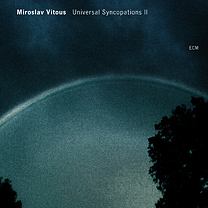Review by Brad Walseth
Miroslav Vitous - Universal Syncopations II
Czechoslovakian double bassist Miroslav Vitous is perhaps best known as a founding member of Weather Report, and for his work with that seminal group, as well as with Chick Corea and Roy Haynes, Terje Rypdal and Herbie Mann in the golden era of fusion. A proponent of the fluid improvisational free-form style he helped originate, Vitous came to the U.S. from Prague in 1966, attended Berklee, performed with Miles Davis, Wayne Shorter, Bob Brookmeyer, Art Farmer, Stan Getz and Freddie Hubbard, releasing a dozen or so albums under his own name before seemingly disappearing from the music scene.
Vitous was for a time, director of the Jazz Department at the New England Conservatory in Boston, before 1988, when he returned to Europe and recorded with saxophonist Jan Garabeck. For over a decade, until 2003's release of Universal Syncopations,not much was heard from the bassist as he instead concentrated on creating an innovative and highly prized sample library of orchestral sounds - in part because he felt he could not afford to hire symphonic orchestras to record demos of his compositions.
The first Universal Syncopations featured John McLaughlin, Jack DeJohnette, Chick Corea and Garabeck, and was received with widespread acclaim. Vitous began working on a follow-up, this time with drummer Gerald Cleaver, saxophonists Gary Campbell and the Yellowjackets' Bob Mintzer (also on bass clarinet), special guests drummer Adam Nussbaum, trumpeter Randy Brecker, Bob Malach on tenor sax, Daniele di Bonaventura on bandoneon and vocalist Vesna Vasko-Caceres.
Vitous, who says he broke with Weather Report due to Josef Zawinul's wanting more repetitive, funk-based bass parts that would fit in with the disco craze, has long been a promoter of the bass as an equal member in the musical conversation, rather than just a time-keeper, and his heart is clearly in the Slavic/European tradition of his youth. Here, time floats freely with Campbell's soprano sax dancing above Cleaver's sensitive, expressive drumming, interacting with Vitous virtuosic bass lines. Overlaid are orchestras, choirs, and on the album opener - "Opera" a choir talking and chuckling. In the hands of lesser talent, this could be chaos, but in this case the results are hypnotic and rewarding. Some more rhythmic moments remind one of Vitous earlier solo work and work with Weather Report on such gems as "I Sing the Body Electric," and "Sweetnighter" ("Opera"), while others shimmer in beautiful waves ("The Prayer," "Gmoong"), the sheer range of sonority produces exciting and surprisingly harmonious music.
"Solar Giant" allows Cleaver a chance to lead off and the Detroit-native's incendiary playing inspires Vitous own feisty bass response, while "Mediterranean Love" features di Bonaventura's romantic heart-tugging artistry on the bandoneon. The 9:04 "Universal Evolution" is a magnum opus of stunning beauty and power with choral vocals and almost Mahler-like tonality.
I asked Vitous how this fascinating recording came about, and he related that he worked up material using his orchestral samples, and had the core band improvise/play to them live. He then went back and replaced the sampled parts with newly recorded orchestral and choral parts. The product of this inspired effort is an amazing sonic collage throbbing with prodigiously potent vibrations.
|

